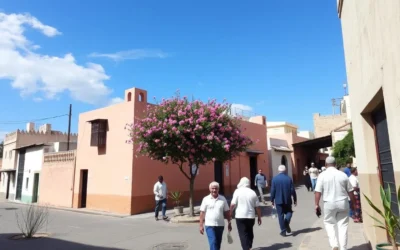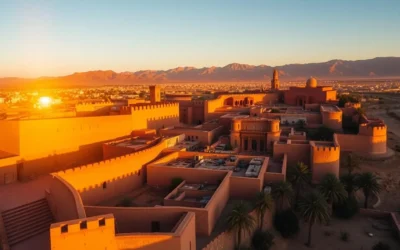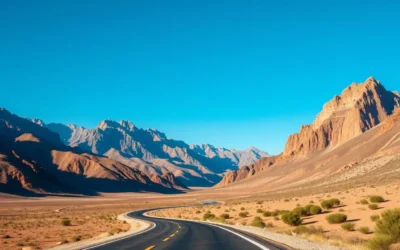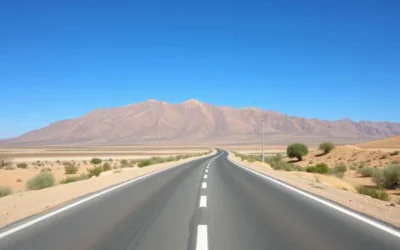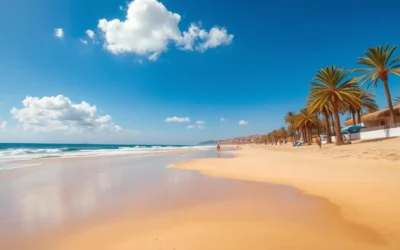Home to North Africa’s highest peak, Mount Toubkal towers at an impressive 4,167 m (13,671′) – yet fewer than 20% of visitors to Morocco ever venture beyond its base trails. This hidden alpine treasure, established in 1942, spans over 100,000 hectares of breathtaking landscapes where ancient Berber villages cling to mountainsides and rare wildlife roams freely among juniper and oak forests.
Getting There & Planning Your Journey
Toubkal National Park is located approximately 70 km (43.5 miles) south of Marrakech, making it surprisingly accessible for such a wild mountain landscape. Most visitors begin their journey from Marrakech, which serves as the main gateway to the park.
From Marrakech to Imlil
The village of Imlil, situated at 1,740 m (5,708′), serves as the primary entry point to Toubkal National Park. You have several options to reach Imlil from Marrakech:
- Grand Taxi: The most direct option costs around 300-400 MAD ($30-40) for the entire taxi. The journey takes approximately 90 minutes.
- Public Transport: Take a shared grand taxi to Asni, then another to Imlil. This budget option costs about 50 MAD ($5) total but may take longer.
- Private Transfer: For convenience, book a private driver for around 600-800 MAD ($60-80) round trip.
- Rental Car: If you prefer independence, consider renting a car for your journey.
Ready to Start Your Toubkal Adventure?
Find the best flight deals to Marrakech and begin your journey to North Africa’s highest peak.
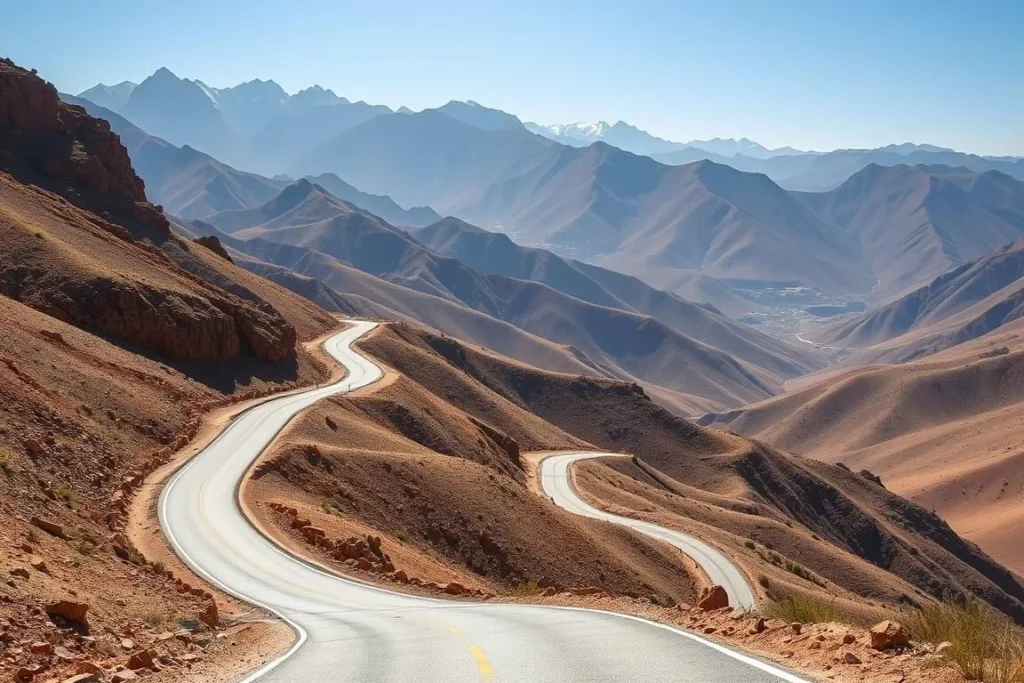
Park Entry Points
The Toubkal National Park has several marked entry points, with the most frequented being:
- Imlil Valley Entrance: The main gateway for those attempting Mount Toubkal
- Ourika Valley: A beautiful alternative entry point about 1 hour from Marrakech
- Setti Fatma: Located in the northeastern corner of the park
From these entry points, exploration is primarily on foot or with the assistance of mules for carrying equipment.
Best Time to Visit & Weather Tips
Toubkal National Park is open year-round, but the experience varies dramatically with the seasons. The park’s high elevation creates distinct climate zones that travelers should consider when planning their visit.
Recommended Seasons
Spring (April to May)
Temperature: 15-25°C (59-77°F) days, 5-10°C (41-50°F) nights
Spring offers comfortable hiking temperatures and blooming wildflowers throughout the valleys. Mountain slopes become vibrant with greenery, and water flows abundantly in streams. This is an ideal time for photography and moderate trekking.
Early Summer (June)
Temperature: 25-30°C (77-86°F) days, 10-15°C (50-59°F) nights
June provides warm days before the intense summer heat arrives. Most trails are clear of snow, and conditions are excellent for summit attempts. This is a popular time for serious hikers aiming to reach Mount Toubkal’s peak.
Autumn (September to October)
Temperature: 20-25°C (68-77°F) days, 5-10°C (41-50°F) nights
Fall brings stable weather, fewer crowds, and beautiful golden landscapes. The scorching summer heat has passed, making this another prime season for trekking and summit attempts.

Seasons to Avoid
Summer (July to August)
Temperature: 30-35°C (86-95°F) days, 15-20°C (59-68°F) nights
Extreme heat makes daytime hiking challenging and potentially dangerous. Trails become dusty, and water sources may be limited. If you must visit during summer, start hikes very early in the morning and carry plenty of water.
Winter (December to February)
Temperature: 5-10°C (41-50°F) days, -5 to -15°C (23 to 5°F) nights
Heavy snowfall makes many trails impassable without specialized equipment. Summit attempts require mountaineering experience, crampons, and ice axes. However, this is an excellent time for experienced winter mountaineers and those interested in snow activities.
Weather Tip
Regardless of season, mountain weather can change rapidly. Always pack layers, rain protection, and sun protection. Temperature drops approximately 6°C (11°F) for every 1,000 m (3,280′) of elevation gain.
Getting Around Locally
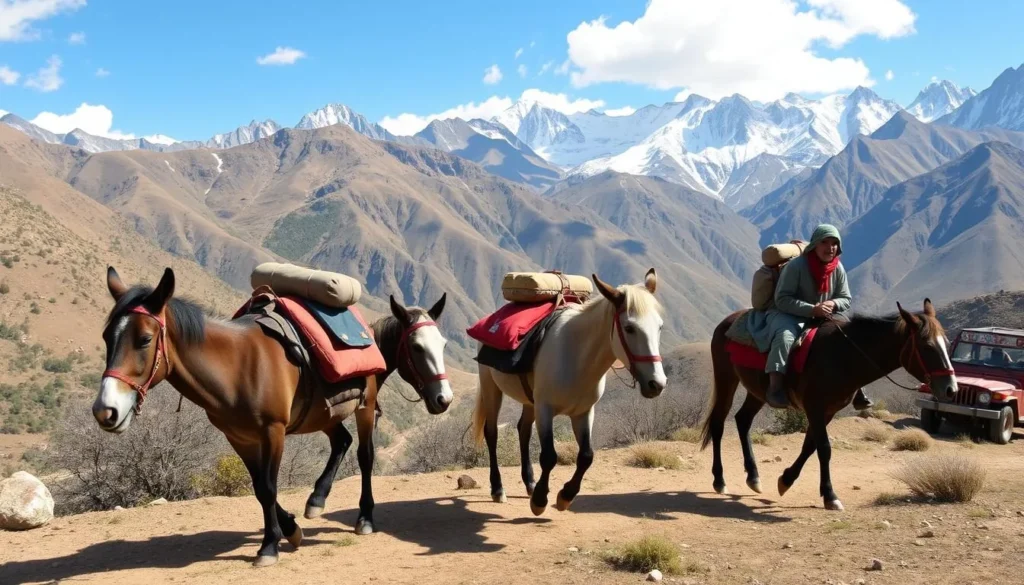
Once inside Toubkal National Park, your transportation options become limited but authentic. The park’s rugged terrain means that exploration happens primarily on foot or with traditional assistance.
Hiking
The most common way to explore Toubkal is on foot via the extensive network of trails. Paths range from easy valley walks to challenging mountain ascents. Many routes connect traditional Berber villages, allowing for cultural immersion along the way.
Mule Transport
For longer treks or summit attempts, local mules can carry equipment and supplies. Hiring a mule with a handler costs approximately 250-350 MAD ($25-35) per day. This traditional method supports the local economy and preserves the park’s natural character.
Local Guides
While not transportation per se, local guides are essential for navigation and safety. Official guides cost around 400-600 MAD ($40-60) per day and provide valuable cultural insights and route knowledge. For summit attempts, guides are mandatory for safety reasons.
Explore Toubkal With Expert Guides
Discover the best guided tours and trekking experiences in Toubkal National Park with certified local experts.
Where to Stay
Accommodation options in and around Toubkal National Park range from comfortable guesthouses to basic mountain refuges. Where you stay will largely depend on your trekking plans and comfort preferences.
In Imlil Village (Gateway)
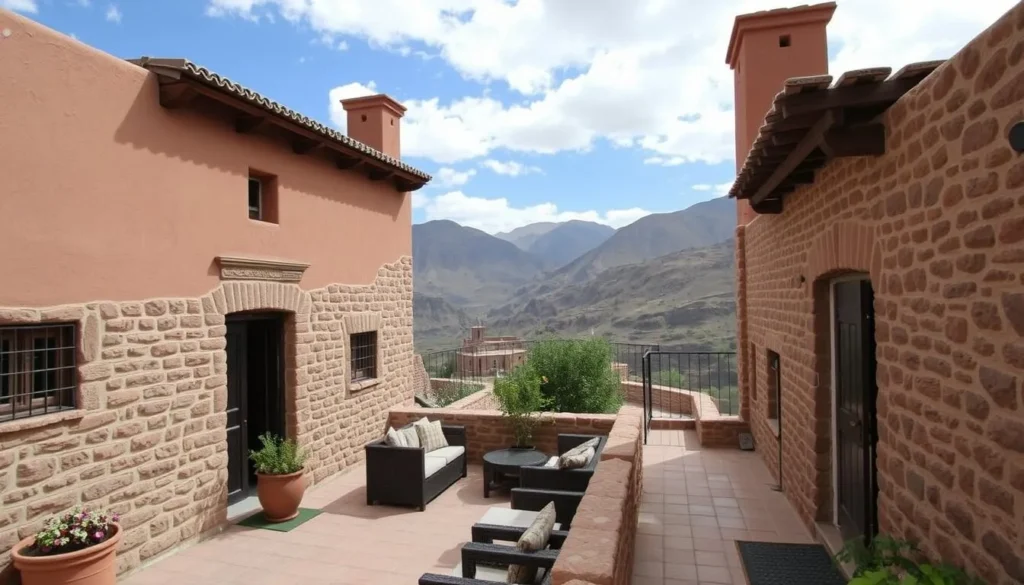
- Guesthouses (Riads): Comfortable accommodations with traditional Moroccan design, typically offering half-board (breakfast and dinner). Prices range from 300-800 MAD ($30-80) per night.
- Homestays: Authentic experiences with local families, providing cultural immersion and home-cooked meals. Expect to pay 200-400 MAD ($20-40) per night.
- Kasbah du Toubkal: A luxury eco-lodge with stunning views and excellent service. Rooms start at around 1,500 MAD ($150) per night.
Find Your Perfect Stay in Toubkal
Browse accommodations ranging from authentic Berber guesthouses to comfortable mountain lodges.
Within the Park
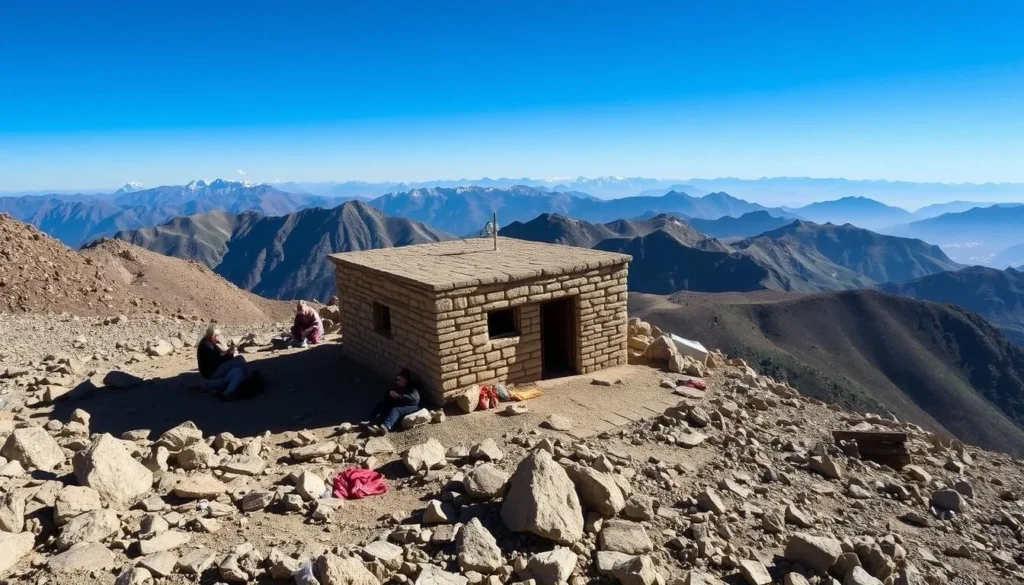
- Refuge du Toubkal (Neltner Refuge): Located at 3,207 m (10,522′), this mountain hut is the main base for summit attempts. Basic dormitory-style accommodation costs around 200 MAD ($20) per night. Meals are available for an additional fee.
- Refuge Les Mouflons: An alternative mountain refuge near the Neltner hut with similar facilities and pricing.
- Camping: Permitted only in designated areas near refuges. Bring your own equipment or arrange rentals in Imlil.
Accommodation Tip
Mountain refuges can become extremely crowded during peak season (June-September). Advance booking is essential, especially for weekend stays. Contact the refuges directly or book through a local guide service.
In Surrounding Villages
The villages of Aremd, Tacheddirt, and Tizi Oussem offer authentic homestays and small guesthouses. These provide excellent options for multi-day treks through the park, allowing you to experience different valleys and communities.
Dining & Local Cuisine
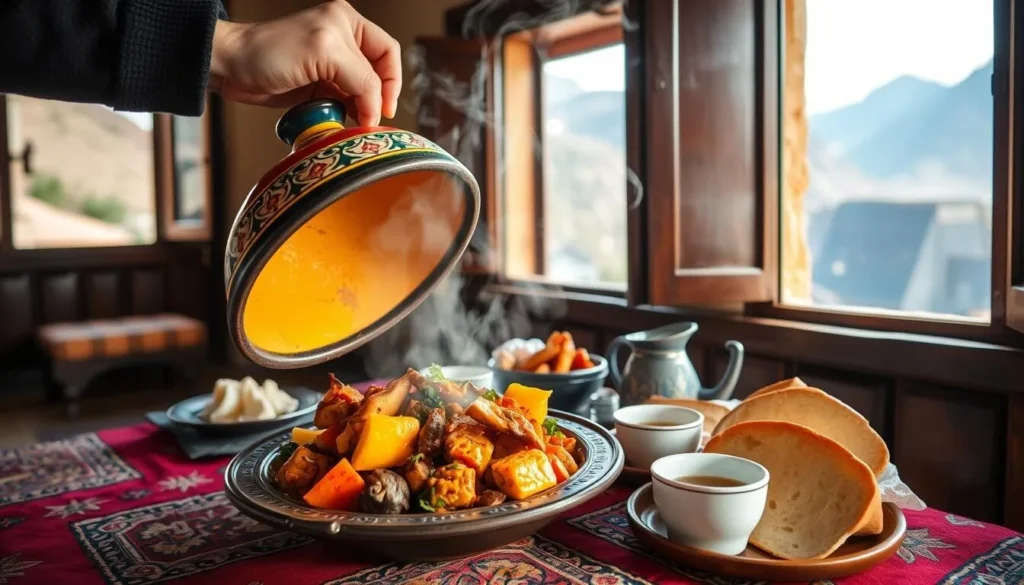
The culinary experience in Toubkal National Park reflects the rich Berber heritage of the High Atlas region. Most meals are prepared with locally-sourced ingredients and traditional cooking methods.
What to Eat
- Tagine: The quintessential Moroccan dish, slow-cooked in a conical earthenware pot. Mountain versions typically feature lamb or chicken with vegetables, dried fruits, and aromatic spices.
- Couscous: Traditionally served on Fridays, this steamed semolina dish comes topped with vegetables and meat in a savory broth.
- Berber Omelet: A hearty breakfast of eggs cooked with tomatoes, onions, and spices, served in a tagine pot.
- Fresh Mountain Bread: Locally baked flatbreads that accompany most meals.
- Mint Tea: The national drink of Morocco, served sweet and hot throughout the day.
Where to Eat
- Guesthouse Dining: Most accommodations offer half-board options with breakfast and dinner included. These home-cooked meals are often the best way to experience authentic local cuisine.
- Mountain Refuges: Basic but hearty meals are available at the refuges for around 70-100 MAD ($7-10) per meal. Advance reservation is recommended.
- Imlil Cafes: The village has several small restaurants catering to trekkers, offering simple Moroccan dishes and international options.
- Trail Picnics: For day hikes, many guesthouses can prepare packed lunches upon request.
Dining Tip
Vegetarian options are increasingly available but may be limited in remote areas. If you have dietary restrictions, communicate them clearly when booking accommodations or hiring a guide. The phrase “ana nabati” means “I am vegetarian” in Arabic.
Attractions, Sightseeing & Activities
Toubkal National Park offers a diverse range of experiences beyond just hiking. From cultural immersion to wildlife watching, there’s something for every type of traveler.
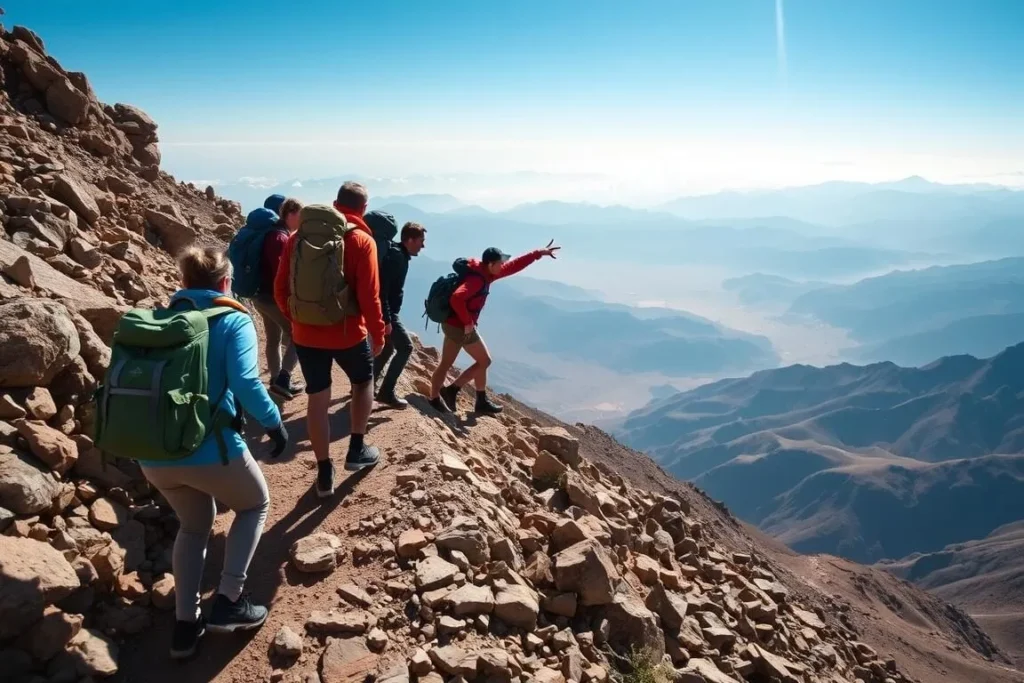
Summit Mount Toubkal
The park’s premier challenge is ascending North Africa’s highest peak at 4,167 m (13,671′). This two-day trek typically involves:
- Day 1: Hike from Imlil to the Neltner Refuge (5-6 hours)
- Day 2: Summit attempt starting pre-dawn, then return to Imlil (10-12 hours total)
A guide is mandatory for safety reasons, and proper equipment is essential. The reward is unparalleled panoramic views across the Atlas Mountains and beyond.
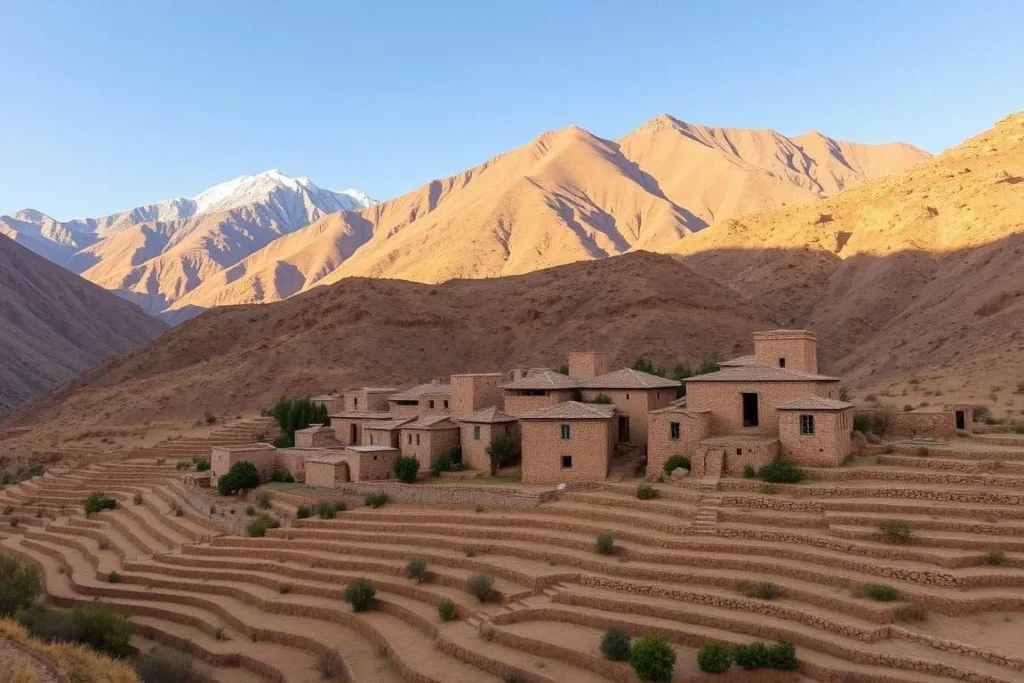
Explore Berber Villages
The valleys of Toubkal are dotted with traditional Berber settlements that have maintained their cultural heritage for centuries. Popular village circuits include:
- Imlil to Aremd to Tizi Mzik (day hike)
- Tacheddirt to Imlil via Tizi Oussem (2-day trek)
- Immane Valley villages (guided cultural tour)
These visits offer insights into traditional architecture, agricultural practices, and the daily life of mountain communities.
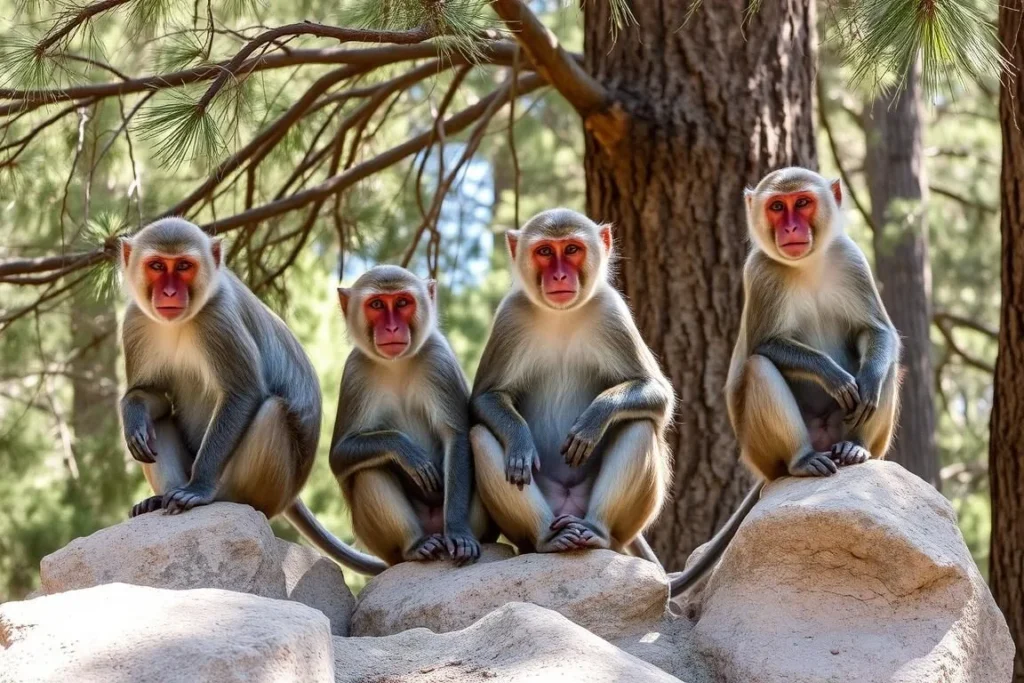
Wildlife Watching
Toubkal National Park is home to diverse wildlife adapted to mountain environments. Key species to watch for include:
- Barbary macaques in forested areas
- Golden eagles soaring above valleys
- Barbary sheep on rocky slopes
- Various endemic bird species
The Ecomuseum of Toubkal National Park near Asni provides excellent information about local ecosystems and conservation efforts.
Day Hikes from Imlil
| Trail Name | Distance | Difficulty | Highlights |
| Imlil Waterfall Circuit | 6 km (3.7 miles) | Easy | Cascading waterfalls, valley views |
| Aremd Village Loop | 8 km (5 miles) | Easy-Moderate | Traditional village, terraced fields |
| Tizi Mzik Pass | 12 km (7.5 miles) | Moderate | Panoramic mountain views |
| Azzaden Valley | 16 km (10 miles) | Moderate | Remote villages, river crossings |
Seasonal Activities
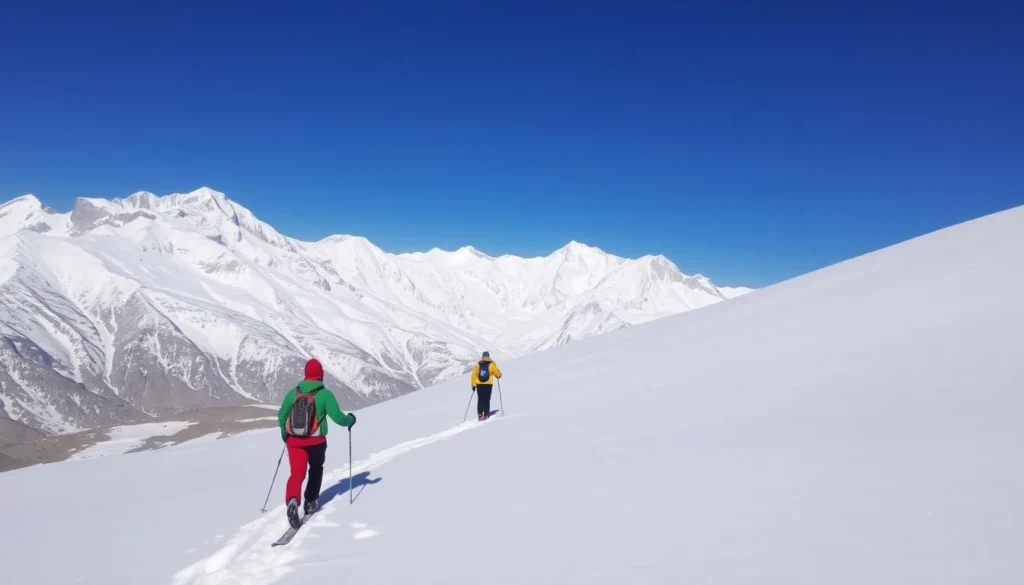
- Winter (Dec-Feb): Ski touring, snowshoeing, and winter mountaineering become popular when snow blankets the mountains.
- Spring (Apr-May): Wildflower photography and bird watching are excellent as the landscape comes alive after winter.
- Summer (Jun-Aug): Early morning hikes to avoid heat, stargazing at night due to clear skies and minimal light pollution.
- Autumn (Sep-Oct): Harvest season brings agricultural activities in villages and perfect conditions for longer treks.
Safety, Etiquette & Local Customs
Mountain Safety
Important Safety Measures
- Hiring a qualified local guide is mandatory for summit attempts and recommended for all significant hikes.
- Do not attempt to summit Mount Toubkal after 3 p.m. due to safety concerns.
- Overnight stays should be at authorized accommodations only; wild camping (bivouac) is not permitted.
- Altitude sickness is a real risk; ascend gradually and stay hydrated.
- Weather can change rapidly; always carry extra layers and rain protection.
Cultural Respect
The Berber communities of the High Atlas maintain traditional lifestyles and customs. When visiting villages or interacting with locals:
- Dress modestly, especially when visiting villages (shoulders and knees covered).
- Ask permission before photographing people.
- Remove shoes when entering homes if invited.
- Accept offers of mint tea as a gesture of hospitality.
- Learn a few basic Berber or Arabic phrases (hello = “salam alaikum”).

Tipping Culture
Tipping (known as “baksheesh”) is an important part of Moroccan culture. General guidelines for trekking in Toubkal:
- Guides: 100-150 MAD ($10-15) per day
- Muleteers: 70-100 MAD ($7-10) per day
- Cooks (on organized treks): 70-100 MAD ($7-10) per day
- Refuge staff: 20-30 MAD ($2-3) per stay
- Restaurants: 10% of bill if service not included
Communication
Mobile coverage is limited within the park but generally available in Imlil and larger villages. Many guesthouses and some refuges offer Wi-Fi. Consider downloading offline maps before your trek.
Practical Travel Tips
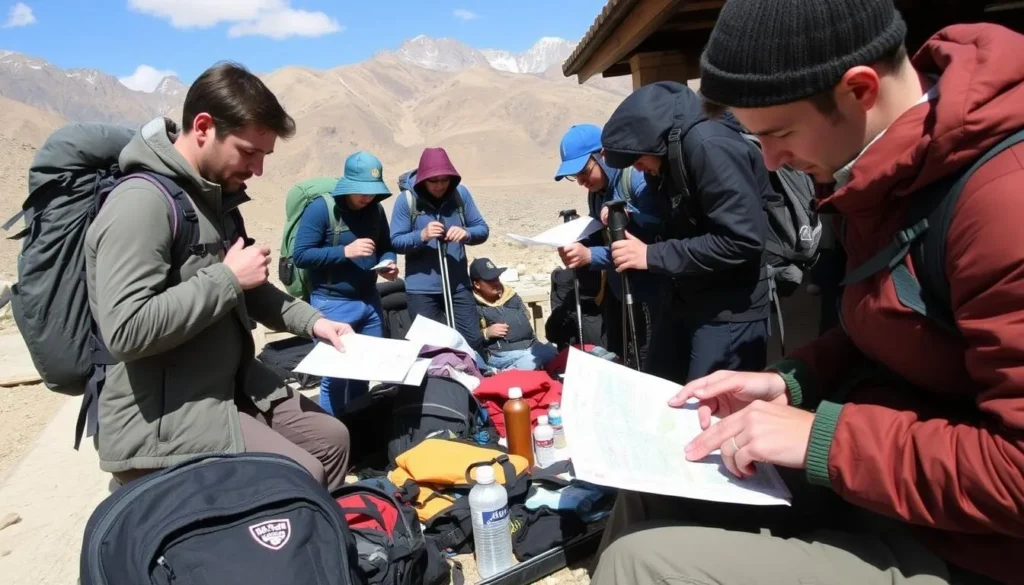
Essential Packing
- Hiking boots with ankle support
- Layered clothing (temperatures vary dramatically)
- Sun protection (hat, sunglasses, sunscreen)
- Headlamp with extra batteries
- First aid kit including blister treatment
- Water purification tablets or filter
- Trekking poles for steep descents
- Warm hat and gloves (even in summer for high altitudes)
Money Matters
- The Moroccan Dirham (MAD) is the local currency
- No ATMs exist within the park; withdraw cash in Marrakech or Asni
- Bring small denominations for purchases in villages
- Most accommodations in Imlil accept credit cards, but mountain refuges are cash-only
- Budget approximately 600-800 MAD ($60-80) per day for guided treks including accommodation, food, and guide fees
Sustainability
- Carry out all trash you bring in
- Use biodegradable soap if washing in streams
- Stay on established trails to prevent erosion
- Support local businesses rather than large tour operators
- Conserve water, a precious resource in mountain communities
- Respect wildlife by observing from a distance
Do I need a permit to enter Toubkal National Park?
No formal entry permit is required for Toubkal National Park. However, you must register with local authorities in Imlil before beginning your trek, especially if attempting to summit Mount Toubkal. Your guide will typically handle this registration process.
Is it safe to drink the water in Toubkal National Park?
Water from mountain springs and streams should be treated before drinking. Use water purification tablets, a filter, or boil water for at least one minute. Bottled water is available in Imlil and at the mountain refuges but creates plastic waste, so bringing a reusable bottle with a purification system is recommended.
Can I trek in Toubkal National Park without a guide?
While technically possible for day hikes on well-marked trails near Imlil, hiring a local guide is strongly recommended for safety, navigation, and cultural insights. For summit attempts of Mount Toubkal, a guide is mandatory according to local regulations implemented after safety incidents in 2018.
Ready for Your Toubkal Adventure?
Toubkal National Park offers an extraordinary blend of natural grandeur and cultural richness that few destinations can match. From standing atop North Africa’s highest peak to sharing tea with Berber families in ancient mountain villages, the experiences here will stay with you long after you’ve descended from the High Atlas.
Whether you’re an experienced mountaineer seeking a new summit or a cultural explorer looking to connect with traditional ways of life, Toubkal’s diverse landscapes and welcoming communities provide endless opportunities for discovery. Pack your hiking boots, bring your sense of adventure, and prepare to be amazed by this Moroccan mountain paradise.
Begin Your Toubkal Journey Today
Your adventure to North Africa’s rooftop starts with a single step – and a quick search for flights below.
The above is subject to change.
Check back often to TRAVEL.COM for the latest travel tips and deals.

